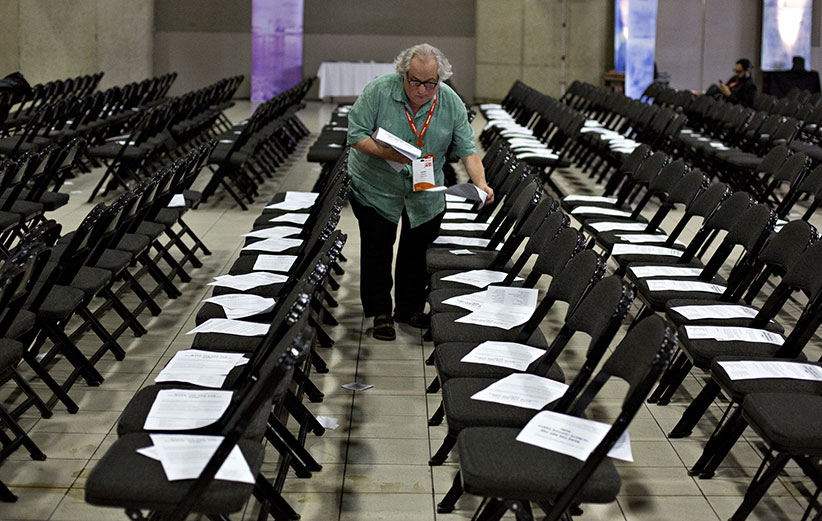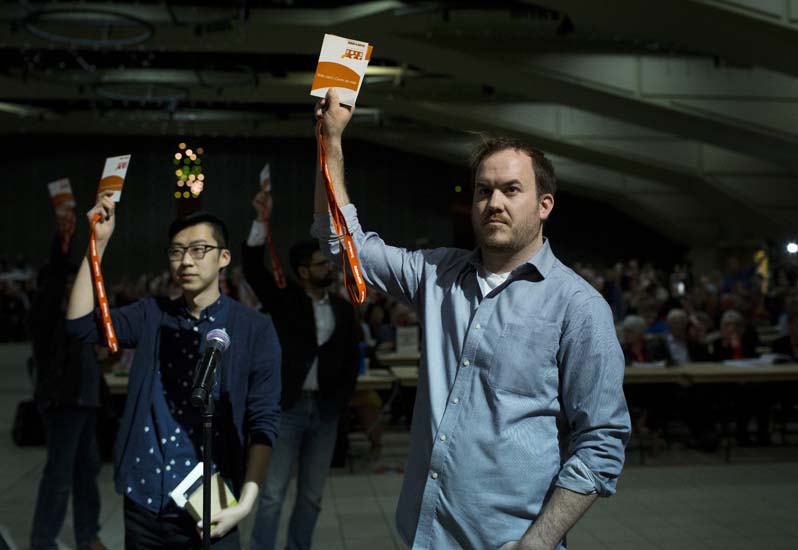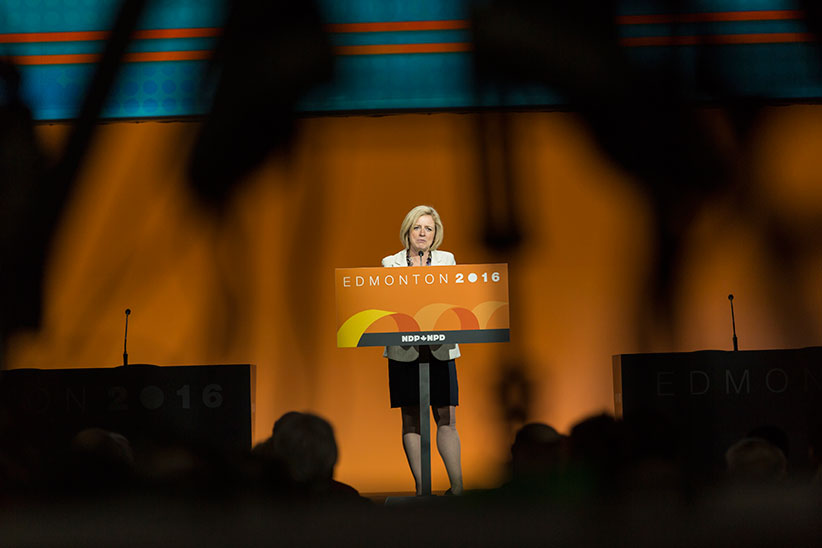The NDP’s hard left turn into an existential crisis
How the Leap Manifesto has touched off an epic fight inside the NDP
NDP buttons at the 2016 NDP Federal Convention in Edmonton, Alberta on Sunday, April 10, 2016. (Photograph by Amber Bracken)
Share

At an almost paperless NDP convention where smartphone apps replaced paper agendas, Harry Kopyto stood out as a pamphleteer. Before proceedings began on Saturday morning, the 69-year-old former Toronto lawyer (disbarred) placed hundreds of legal-sized printouts urging full adoption of the Leap Manifesto on empty folding chairs.
A pair of convention volunteers went row by row and collected the pages before anyone could sit down.
One day earlier, Kopyto had pressed a similar three-page document in the faces of as many New Democrat delegates as he could. Its headline: Make the NDP the climate justice party now!
“I struggle to make an activist party, a party that is involved in building a movement, and not just an election machine. You can do both,” said Kopyto, sweat quickly accumulating at his brow. He referred to stopping the “tar sands” when most NDPers had fallen in with the “oil sands” conventional phrasing, and demanded a full embrace of Avi Lewis’s manifesto to stop new pipelines and rapidly shift away from fossil fuels, while the party was set to instead consider a major two-year debate on its wide-ranging elements.

Kopyto didn’t get his way at the Edmonton convention, as he’s grown accustomed to—he blasted Ontario’s NDP premier Bob Rae in the 1990s for being too right-wing, and has lost many battles at the Law Society of Upper Canada. But he feels a lot less lonely after his party voted to place a deep-green manifesto at the heart of its new soul-searching exercise.
“The wind is in our sails,” he said after the convention. “The same forces that are shaping [Jeremy] Corbyn’s victory in the British Labour Party, and that are attracting young activists to [Bernie] Sanders are playing out in Canada as well. The NDP has a potential of being transformed.”
When a guy like Kopyto feels wind in his sails, others will feel shortness of breath. Alberta’s NDP made its own leap last year from perennial obscurity to government majority, and sees political survival linked to approved pipelines and a robust oil sands economy—and to blasting the “so-called manifesto” as “naïve” and “thoughtless,” in Premier Rachel Notley’s words. Federal party MPs want little to do with Leap and its authors, either. NDP leadership for years under Jack Layton and Tom Mulcair had proven effective at keeping the party’s more extreme wings either mollified or at bay, and will repeatedly assert that Corbyn and Sanders have split their parties and have so far won precisely nothing.
That era is over now, with a surprisingly clear denouncement of Mulcair—the unprecedented 52 per cent Yes vote for a leadership review—and an even clearer embrace of Leap, or at least a major study of it. Two things have shown the ability to fire up New Democrats. One is success, which Layton brought in 2011 but Mulcair saw peak in 2015, two months before the election. (The Liberals, with Justin Trudeau and a decidedly leftward shift, easily snuffed out those chances, reducing the 95-member caucus to 44). But that other fire flared up last weekend: a brassy and bold unifying idea, the likes of which Canadian politics haven’t really given much oxygen since the Stéphane Dion Liberals’ Green Shift. Call them the party radicals or the grassroots, depending on your perspective: NDPers who like to wave signs or wear buttons often prefer to brandish a slogan, rather than some leader’s name. The party’s internal campaign review said it sorely lacked a “strong, simple narrative.” Intertwined in the NDP’s search for a leader will be the quest for a narrative to convey on those buttons. A bowl of “No pipelines” will get snapped up faster than the “More effective consultation on energy infrastructure” buttons.
It wasn’t that the NDP was without distinct policy last fall. Members wore those catchy supermarket checkout clerk-like badges: $15 child care (ask me for details)! Do you want our $15 minimum* wage! (*offer valid for federally regulated employees only)! Mulcair’s balanced-budget promise sought to reassure NDP-wary voters but also curtailed the party’s ambition, while the Liberals peeled off progressive support with its own abandonment of a budget-balance pledge, plus its exciting flash of radicalism—a vague plan to legalize marijuana. Abacus Data polling last month said Canadians are more likely to think the NDP will “promise anything to win votes” than the Liberals are, an unusual spot for a party so rooted in principle and ideology. Several members are privately resigned to the Liberals winning another term or two—the thinking goes that if power is elusive, protest is livening, and could form a longer-term party push to NDP victory.
Another big idea could have captured party passions, if Leap’s deep-green agenda wasn’t dangling there for the hungry. The party did pass resolutions backing safe injection sites, and letting 16-year-olds vote. If those aren’t broadly ambitious enough, there was one available on loan from the Sanders campaign: free tuition. New party president Marit Stiles said although tuition is normally deemed a provincial matter, it’s “something we’ll have to talk about” that could fight inequality and has excited youth delegates. After his corker of a convention speech, NDP elder statesman Stephen Lewis said members need something intellectual to chew on after the type of “vacuity of policy” that left-wing parties occasionally find themselves in. “And maybe we’ve had a certain hollow moment,” he told reporters.
Dan Darrah caught himself praising the “adoption of Leap” and quickly softens his words when telling Maclean’s how much better he feels post-convention than he did mid-convention. “Up until [this] convention, I was very much of the idea I was in the minority,” said the Ryerson University student from Ajax, Ont. “We’ve got a bit of a power vacuum, and a lot of people will be vying for power. This will be the time, if there ever was a time, that activists will be in the fold of electoral politics.”
Ali Chatur told the convention Leap got overwhelming support in the youth caucus, and a tougher climate policy can reinvigorate campus wings. “I can’t stress how important this debate is for youth,” said the Young New Democrats co-chair as his group flanked him, including one teen in a tightly fitting Bernie Sanders for President T-shirt.
Aside from organized labour, few groups readily ally themselves with the NDP these days. An ambitious cri de coeur is easier to get behind. Leap had among its initial signatories Idle No More, Toronto’s Black Lives Matter and Maude Barlow’s Council of Canadians. “Social movements are surging in Canada, racking up progressive victories and building new alliances across traditional divides,” Avi Lewis told the convention before the Leap resolution passed. “These are the people behind the Leap. Send a message that the party wants to join them.”
Some former MPs helped bring Lewis’s manifesto to the convention floor: Vancouver veteran Libby Davies and Craig Scott of Layton’s former seat of Toronto–Danforth, which he lost in last fall’s Liberal sweep of Toronto. Remaining parliamentarians were among the quickest to shrug off Leap, noting that Lewis has had little to do with the party, and his co-author and wife, Naomi Klein, even less (she didn’t attend the convention). Kennedy Stewart, MP for Burnaby South, said he and the party already agree with much of Leap’s platitudes on matters like child care and green jobs, but his party doesn’t need a platform written on a coffee table. “For somebody who said ‘no logo,’ Leap is kind of a logo,” Stewart said, referring to Klein’s anti-consumerism 1999 bestseller.
Related: How Klein became Canada’s only voice for angry socialism
Having proven unable to tamp down the Leap debate at the convention, MPs, Alberta members and party professionals will try to tame its radical edges in the riding-by-riding discussions now pledged to occur before the 2018 party convention. “If the New Democrats are serious about their policy book, I don’t think they’re going to hand them over to Avi Lewis and Naomi Klein, just ’cause,” says former party official Ian Capstick, who identifies himself with what exists of a right flank of the NDP. To Capstick, his party is “entering the existential crisis phase.” As that begins, he can’t stop thinking of friends in the Netherlands, where the Socialist Party’s logo is a red tomato (which members like to hurl at opponents). “People who wear those buttons are really comfortable being in an opposition role, and therein lies the single-largest schism you’re going to see in the next year and a half.”

It was novel for the New Democrats to come as close to power as it did recently, taking official Opposition status and then briefly flirting with a national lead in the polls. Schisms with its left flank are more familiar. The Waffle movement of the 1960s and 1970s was the party’s last manifesto insurgence, with a Manifesto for an Independent Socialist Canada and plans to nationalize industry. The Waffle was rejected by federal leader David Lewis and Ontario leader Stephen Lewis, respectively Avi’s grandfather and father. In 2001, some MPs and activists formed the hard-left New Politics Initiative to bring in the then-thriving anti-globalization movement that helped make Klein’s No Logo an international success. The NPI feared the NDP’s struggles under leader Alexa McDonough were because of her centrism. That faction’s leaders, like Davies and Rabble.ca founder Judy Rebick, got behind the leadership campaign of a Toronto city councillor named Jack Layton and the group disbanded in 2004. The rest is history, of course: Layton eschewed radicalism; as his appeal grew nationally, so did the NDP caucus. The 2011 Orange Wave came with a platform whose placid title could have belonged to any party’s book: Giving Your Family a Break—Practical First Steps.
However, Layton was better able to unify the moderates and policy hawks—“Jack had the aura of being an activist,” Kopyto said—than was Mulcair, who came to the NDP fold after quitting the Quebec Liberal cabinet.
While it’s true that Notley won with the Alberta Tory dynasty and other opposition parties crumbling all around her, the Alberta NDP platform for 2015 had blanched out many past pledges to slash university tuition fees, regulate the electricity network or tightly control the pace of oil sands expansions. She’s brought in comprehensive climate reforms and a carbon tax, but she is using those commitments to try and secure national support for the Energy East and Trans Mountain pipelines, references that received only tepid applause in a convention speech that otherwise had NDP delegates overjoyed by her enthusiasm and winning ways.
The public campaigns for and against Leap wound up rivalling the volume of the weekend’s leadership chatter, and showed how the Alberta NDP’s pragmatism can extend to bashing close political friends. Environment Minister Shannon Phillips’ declaration that Leap was a “betrayal” by Torontonians was a direct hit on Lewis, whose work she had helped produce while working at CBC and Al-Jazeera. More quietly, Alberta backbencher Heather Sweet led a successful bid to quash a convention resolution to ban tankers off British Columbia’s north coast, promoted by the riding association of MP Nathan Cullen, a past NDP leadership contender and a western power broker.

While promoters of Leap insisted all they were asking for was a debate, it was a debate Albertans knew would be spun by opponents. Before one rival to Notley could compare Leap to the 1980s National Energy Program—which made the Liberal brand toxic in Alberta for a generation—Alberta labour leader Gil McGowan warned there could be NEP-level political damage. McGowan was so irked at the resolution’s support he urged reporters to give him a few minutes to gather his thoughts; later, he wound up to a CBC microphone. “These downtown Toronto political dilettantes come to Alberta and track their garbage across our front lawn,” he said. Avi Lewis may have been the popular scion on the Leap file, but speaking against it was Joe Barrett, son of another NDP icon: Dave Barrett, who was B.C. premier while Avi’s father led an Ontario opposition party. Joe Barrett warned that the NDP shouldn’t be seen as against building anything anywhere, and said this political setback of a manifesto could help lead to more oil-by-train activity instead. “We’re a green party,” Barrett said. “We don’t need to be attacked by the self-righteous on the other side. We know where we stand.”
While the compromisers and idealists wage battle, both sides are aware how Canada’s left has drifted toward the Liberals. An Abacus poll last month showed the Liberals led the NDP by 51 per cent to 26 among those who identify as centre-left, and 47 to 23 among leftists. An embrace of Leap stands to help the NDP reclaim those supporters, but those are small prizes: seven per cent of respondents told Abacus they consider themselves to be on the left and 20 per cent centre-left. In the centre sit 54 per cent of Canadians, and even under the more centrist Mulcair, NDP found themselves a distant third with that larger group.
“Don’t let this very divided vote divide us,” Mulcair said in his concession speech after the leadership review. New Democrats showed little eagerness to heed his pleas before the leadership vote, and will feel less compelled to afterwards. MPs from Quebec and B.C. may feel more liberated now to launch regional anti-pipeline campaigns of their own, while the pro-Palestinian faction that perennially bubbles beneath the party’s surface—some advocates were barred as candidates—will try to insert itself into the party’s new vision quest.
Giving such movements oxygen can bring scorn from rivals, but the establishment should make them somehow feel included, Capstick said. “They’ve been afraid of conflict. They’ve been afraid of listening to people who want to ride in a flotilla to Palestine, people who are animal rights activists,” he said. “We haven’t embraced the climate change activists to the degree we probably should have. That’s because the professionals, of course, are afraid of those who bring their own branded sign.”
Of course, Capstick’s in the camp that worries that pursuing Corbyn-ism is a black hole. Solidarity is a traditional watchword of the left, but it won’t be easy to forge it within the NDP for the next couple years.
—with John Geddes